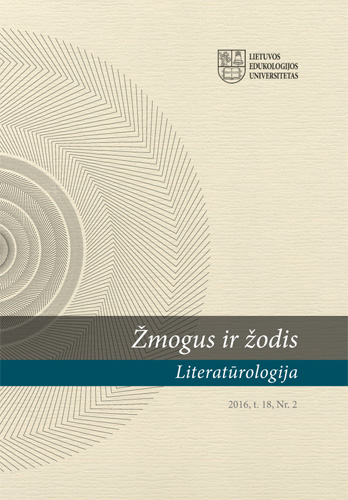Moters socialiniai vaidmenys privačiame diskurse: Zofijos Kriaučiūnienės laiškai Mailai Talvio
Women’s social roles in a private discourse: Zofija Kriaučiūnienė’s letters to Maila Talvio
Author(s): Žydronė KolevinskienėSubject(s): Gender Studies, Education, Cultural history, Recent History (1900 till today), Lithuanian Literature, 19th Century
Published by: Vytauto Didžiojo Universitetas
Keywords: Zofija Kriaučiūnienė; Petras Kriaučiūnas; national revival; family as a partnership; public and private discourse; women’s social roles; epistolary legacy;
Summary/Abstract: The article discusses the letters of Zofija Kriaučiūnienė (1846-1912) written in 1894-1909 to the Finnish writer, Maila Talvio-Mikkola (1871-1951), translated into the Lithuanian and published in the book, Nemuno krašto aidai: laiškai Mailai ir Josepiui Mikoloms (The Echoes of Nemunas Land: Letters to Maila and Jooseppi Julius Mikkola; 1996). The correspondence shows the field where women act by combining both public and private spheres and when a little story is incorporated into the grand narrative of a nation and homeland. The main focus of the article is on women’s social roles being constructed in the process of formation of national identity. It notes that in comparison to other letters written by educated women (such as Marta Zauniūtė and Liudvika Didžiulienė) of that time, Kriaučiūnienė’s letters stand out for its full elimination of feelings towards her husband Petras Kriaučiūnas, teacher, book smuggler and active member of Lithuanian national revival movement. The article also observes that the rhetoric of motherly concern, strongly suggested by Lithuanian intelligentsia at the end of the 19th and at the beginning of the 20th centuries, was present not only in private but also in public sphere of a woman’s life and that mother’s archetype became essential in forming a new woman social model in the history of national revival. The conclusion is made that in literature and cultural history, Lithuanian women of education remained only wives (daughters, daughters-in-law, or sisters) of the activists of the national movement. Although they were the real engines of cultural life of that time, women stayed on the margins of the fight for Lithuanian identity.
Journal: Žmogus ir žodis
- Issue Year: 18/2016
- Issue No: 2
- Page Range: 63-80
- Page Count: 18
- Language: Lithuanian

